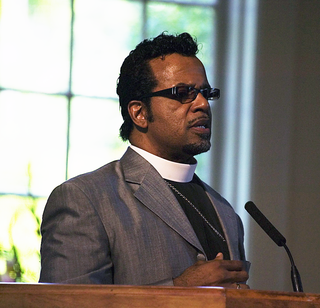A Quote by Gregory of Nazianzus
There is One God and One Mediator between God and man, the man Jesus Christ (cf. I Tim. 2:5). For He still pleads even now as man for my salvation; for He continues to wear the Body which He assumed, until He make me a god by the power of His Incarnation; although He is no longer known after the flesh (cf. II Cor. 5:16) ? I mean, the passions of the flesh, the same, except sin, as ours.
Related Quotes
The fields are still ripe for harvesting (cf. Jn 4:35); God continues to give the growth (cf. 1 Cor 3:6). We can and must believe, with the late Pope John Paul II, that God is preparing a new springtime for Christianity (cf. Redemptoris Missio, 86). What is needed above all, at this time in the history of the Church in America, is a renewal of that apostolic zeal which inspires her shepherds actively to seek out the lost, to bind up those who have been wounded, and to bring strength to those who are languishing (cf. Ez 34:16).
O man, do you believe that Christ is God? If you believe, fear, and keep His commandments? there is no other God but He (cf. Dt. 4:35). To Him no one is equal, nor can become equal (cf. Is. 40:18). He is Ruler of all things, the Judge of all, the King of all, the Maker of light and the Lord of life. He is the Light that is ineffable, inaccessible (cf. I Tim. 6:16), and He is the Only One. By His appearing He causes all His enemies to vanish before His face (cf. Ps. 68:2 f.), as well as those who do not perform His commandments, just as the sun when it rises drives away the darkness of night.
Thus in this oneness Jesus Christ is the Mediator, the Reconciler, between God and man. Thus He comes forward to MAN on behalf of GOD calling for and awakening faith, love and hope, and to GOD on behalf of MAN, representing man, making satisfaction and interceding. Thus He attests and guarantees to God's free GRACE and at the same time attests and guarantees to God man's free GRATITUDE.
I am not an ape, I am a man. The world has been created by God. Man has been created by God. It is not possible for man to understand God - God understands God. Man is God and therefore understands God. I am God. I am a man. I am good and not a beast. I am an animal with reason. I have flesh, I *am* flesh, I am not descended from flesh. Flesh is created by God. I am God. I am God. I am God.
By His gracious condescension God became man and is called man for the sake of man and by exchanging His condition for ours revealed the power that elevates man to God through his love for God and brings God down to man because of His love for man. By this blessed inversion, man is made God by divinization and God is made man by hominization. For the Word of God and God wills always and in all things to accomplish the mystery of His embodiment.
Holy love has a way of consuming some. This is what is meant by the one who said, 'You have ravished our hearts' (Sg. Of Sgs. 4:9). And it makes others bright and overjoyed. In this regard it has been said: 'My heart was full of trust and I was helped, and my flesh has revived' (Ps. 27:7). For when the heart is cheerful, the face beams (cf. Prov. 15:13), and a man flooded with the love of God reveals in his body, as if in a mirror, the splendor of his soul, a glory like that of Moses when he came face to face with God (cf. Ex. 34:29-35).
All men ought to think of Christ because of the office Christ fills between God and man. He is the eternal Son of God through whom alone the Father can be known, approached, and served. He is the appointed Mediator between God and man through whom alone we can be reconciled with God, pardoned, justified, and saved.
The struggle between God and man breaks out in everyone, together with the longing for reconciliation... God does not love weak souls and flabby flesh. The spirit desires to wrestle with flesh which is strong and full of resistance. It is a carnivorous bird which is incessantly hungry; it eats flesh and, by assimilating it, makes it disappear.
The death of Christ made it possible for God to accept sinful man, and that he has, in fact, done so. Consequently, whatever separation there is between man and the benefits of God's grace is subjective in nature and exists only in man's mind and unregenerate spirit. The message man needs to hear then, is not that he simply has a suggested opportunity for salvation, but that through Christ he has, in fact, already been redeemed to God and that he may enjoy the blessing that are already his through Christ
'Now we are the sons of God'. This is the starting point of adoption. However, 'it does not yet appear what we shall be: but we know that, when He shall appear, we shall be like Him; for we shall see Him as He is' (I Jn. 3:2). This is the perfection of adoption of sons and renewal which God bestowed on us in Christ, and of which John says in his Gospel that, 'Christ gave power to become the sons of God, even to them that believe on His name: which were born, not of blood, nor of the will of the flesh nor of the will of man, but of God' (Jn. 1:12-13).
For the essence of sin is man substituting himself for God [Gen. 3:1-7], while the essence of salvation is God substituting himself for man [2 Cor. 5:21]. Man asserts himself against God and puts himself where only God deserves to be; God sacrifices himself for man and puts himself where only man deserves to be.
It is God's earth out of which man is taken. From it he has his body. His body belongs to his essential being. Man's body is not his prison, his shell his exterior, but man himself. Man does not "have" a body; he does not "have" a soul; rather he "is" body and soul. Man in the beginning is really his body. He is one. He is his body, as Christ is completely his body, as the Church is the body of Christ
A Christian is one who recognizes Jesus as the Christ, the Son of the living God, as God manifested in the flesh, loving us and dying for our redemption; and who is so affected by a sense of the love of this incarnate God as to be constrained to make the will of Christ the rule of his obedience, and the glory of Christ the great end for which He lives.









































